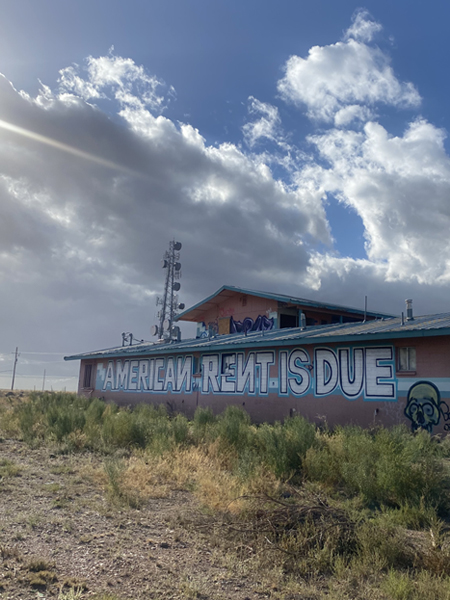Cassie Job Saw Health Disparities Firsthand
November 29, 2023
 Cassandra Job, Cassie, (she/her) is a second-year physician assistant (PA) student in the class of 2024. Coming to Drexel University’s College of Nursing and Health Professions from Portland, Oregon, she just completed a clinical rotation in Kayenta, Tó Dínéeshzheeʼ, a U.S. town which is part of the Navajo Nation in Navajo County, Arizona.
Cassandra Job, Cassie, (she/her) is a second-year physician assistant (PA) student in the class of 2024. Coming to Drexel University’s College of Nursing and Health Professions from Portland, Oregon, she just completed a clinical rotation in Kayenta, Tó Dínéeshzheeʼ, a U.S. town which is part of the Navajo Nation in Navajo County, Arizona.
Job was drawn to the physician assistant profession for its growing role in improving health care access and quality. Coming from a Latino immigrant family, she has witnessed her family’s challenges interacting with a health care system that was not designed for them. “This inspired me to enter a field in which I could provide evidence-based, compassionate medical care to better serve the needs of my community among others,” Job shared. “I also appreciate the profession’s versatility, collaborative culture and emphasis on work-life balance. I have many diverse interests, so I am excited that this path will enable me to pursue them.”
The mission of the CNHP’s PA program is to provide care to underserved populations, and because of that, providing care on a Native American reservation speaks to our students. “My decision to complete a clinical rotation in Kayenta was driven by a combination of professional and personal motivations.” By working closely with Navajo patients, health care workers and community members, Job hoped to gain insight into the cultural nuances and specific challenges faced by the community to strengthen her ability to provide patient-centered care and contribute meaningfully to efforts to improve health care access and outcomes. She also was aware that the site was a great place to learn due to the extensive one-on-one training. “On a personal level, I was excited about the opportunity to visit an area I had never seen before. I enjoyed spending my off days exploring sites such as Monument Valley, Antelope Canyon, Grand Canyon and Arches National Park. It was refreshing to spend quality time connecting with myself and my surroundings.”
 When asked what she gained as a physician assistant student from the experience, Job said that her experience in the emergency room provided the opportunity to practice clinical skills such as suturing, incision and drainage, CPR and intubation. However, it was the community interactions that made this rotation incredibly rewarding for her. Working with Navajo sheep herders, bullfighters and ranchers exposed her to different lifestyles and worldviews, honing her ability to navigate diverse settings and tailor her approach to better serve the needs of each patient. “The resource-limited setting enhanced my problem-solving skills and resourcefulness, reinforcing the importance of collaboration with the health care team. Furthermore, spending five weeks in a rural and unfamiliar location cultivated resilience and adaptability.” Job shared that some days were challenging and lonely, but getting through them gave her a sense of confidence to approach new situations with enthusiasm and an open mind. “I am grateful for the lessons learned, and I am excited to apply my experience in Kayenta to future practice as a PA.”
When asked what she gained as a physician assistant student from the experience, Job said that her experience in the emergency room provided the opportunity to practice clinical skills such as suturing, incision and drainage, CPR and intubation. However, it was the community interactions that made this rotation incredibly rewarding for her. Working with Navajo sheep herders, bullfighters and ranchers exposed her to different lifestyles and worldviews, honing her ability to navigate diverse settings and tailor her approach to better serve the needs of each patient. “The resource-limited setting enhanced my problem-solving skills and resourcefulness, reinforcing the importance of collaboration with the health care team. Furthermore, spending five weeks in a rural and unfamiliar location cultivated resilience and adaptability.” Job shared that some days were challenging and lonely, but getting through them gave her a sense of confidence to approach new situations with enthusiasm and an open mind. “I am grateful for the lessons learned, and I am excited to apply my experience in Kayenta to future practice as a PA.”
 Drexel has played a pivotal role in equipping Job with the knowledge, skills and perspectives to recognize and address health disparities. “The didactic year curriculum is designed to foster a comprehensive understanding of the social determinants of health and their impact on different populations with courses such as patient communication, medical ethics, biopsychosocial issues and health policy.” These courses create space to engage in meaningful conversations about these topics between classmates, each of whom offers valuable life experiences and perspectives. “Drexel’s clinical rotation sites include a variety of settings with diverse patient populations. From training in a rural ER on Navajo Nation to a women’s health clinic in a predominantly Vietnamese community in Orange County, California, I am gaining firsthand exposure to the complex interplay between geographic location, socioeconomic status, cultural factors and health care access that contribute to disparities in health outcomes. I view each day as an opportunity to learn and grow as a provider and healthcare advocate.”
Drexel has played a pivotal role in equipping Job with the knowledge, skills and perspectives to recognize and address health disparities. “The didactic year curriculum is designed to foster a comprehensive understanding of the social determinants of health and their impact on different populations with courses such as patient communication, medical ethics, biopsychosocial issues and health policy.” These courses create space to engage in meaningful conversations about these topics between classmates, each of whom offers valuable life experiences and perspectives. “Drexel’s clinical rotation sites include a variety of settings with diverse patient populations. From training in a rural ER on Navajo Nation to a women’s health clinic in a predominantly Vietnamese community in Orange County, California, I am gaining firsthand exposure to the complex interplay between geographic location, socioeconomic status, cultural factors and health care access that contribute to disparities in health outcomes. I view each day as an opportunity to learn and grow as a provider and healthcare advocate.”